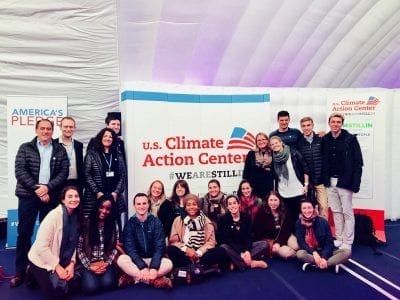
…Second Nature has led higher ed’s involvement in We Are Still In (WASI) from the outset and we helped coordinate the sector’s involvement in the US Climate Action Center. We had presidents and faculty involved in panels at the Center and co-hosted a reception there with AASHE, Tufts, and UConn, which had a great turnout. It was wonderful to see US higher education so well-represented and we heard from many other countries how encouraged they were by the US Climate Action Center!
As we all trickle back stateside from Bonn…there is a lot of interest from across the US in exploring ways higher education can accelerate cross-sector (not simply internal) climate solutions as part of the aligned work of WASI coming out of the COP. This has the potential to not just accelerate your own goals, but also meet the broad social needs as well. As one colleague from WWF put it – WASI may act best as a traffic cop who makes sure all the lights stay green!
There are a number of strategies we’ve been discussing with institutional presidents, faculty, and staff, as well as the WASI Steering Committee…We want creative ideas to germinate…
– Dr. Timothy Carter, President, Second Nature
The following blogs were written by student members of the UConn contingent to the UN Climate Conference (COP 23) in Bonn, Germany:
The Importance of Sub-National Entities Caroline Anastasia
COP 23 Leaving the U.S. Government Behind Weston Henry
International Aid & Dignity in the Face of Climate Change Adrianna Antigiovanni
A Sneak Peak of ‘The Age of Consequences’ Katie Main
Additional blogs describing the cohort’s experiences at COP 23 will be posted throughout the next few weeks.
The Importance of Sub-National Entities
Caroline Anastasia, Chemistry, Minor in Mathematics
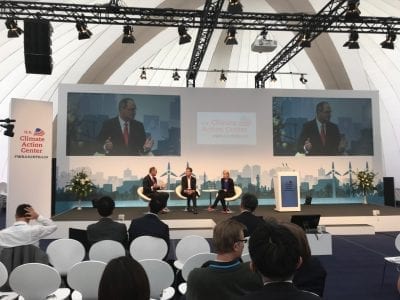
With the United States federal government clearly choosing to stand on the sidelines in the fight against climate change, it is more important than ever for sub-national entities to step into the ring. Since the Trump administration made the highly-contested decision to pull out of the Paris Agreement in June 2017, many state and local governments, activist groups, businesses, and universities have stepped up to the challenge and have already begun to prove that they can fight against climate change and yield clear results, with no need for assistance or support by the federal government.
The necessity of sub-national action has been reinforced many times over at the COP23 UN Climate Change Conference in Bonn, Germany. In her opening remarks at the U.S. Business Showcase in the U.S. Climate Action Center, Sheila Bonini (Senior VP, Private Sector Engagement, World Wildlife Fund) asserted that “when the government does less, we need to do more.” In this case, We encompasses everyone from sub-national governments to activist organizations; from businesses to universities to citizens across the country. Already, over 400 cities have pledged to cut pollution, and over 600 universities have committed to eliminate their carbon pollution within a certain number of years.

Businesses have also addressed the issue of climate change, with countless corporations adopting sustainable business plans to reduce their emissions. Mars, Inc. had a large presence at the COP23 conference in the U.S. Climate Action Center, where they shared their impressive plans to decrease their carbon footprint. They also handed out M&Ms printed with the slogan We Are Still In.
Oregon governor, Kate Brown, also instilled the importance of sub-national governments in the fight against climate change. Governor Brown spoke at the U.S. Governors’ Panel in the U.S Climate Action Center, where she discussed the imperative action required by state governments in order to meet the targets stated in the Paris Agreement.
Despite the complete disregard of climate change by the federal government, not all hope is lost. Sub-national entities have proven that the U.S. still has a strong commitment to the environment, and although there is still so much work to be done, I feel like I can let out a small sigh of relief because of the commitment to continue striving towards future goals. Trump may have pulled out of Paris, but sub-national entities, including the University of Connecticut, promise that #wearestillin.
COP23 Leaving the U.S. Government Behind
Weston Henry, Ecology & Evolutionary Biology and Landscape Architecture
In every single panel, there has been one common thread: hope. It was definitely not a theme that I expected, here at the first Conference of Parties since Trump’s announcement of the United States’ withdrawal from the Paris Agreement. But through the responses of groups around the world, it was clear that many within the US are not giving up on climate action, but rather pushing forward more than ever before.
Through the events of the past few days, we have seen the representation of many interests. We have seen overtly anti-capitalist NGO leaders represented at the women’s panel, telling us how their lives and communities have been directly impacted by the horrifying realities of extreme weather events and sea level rise.
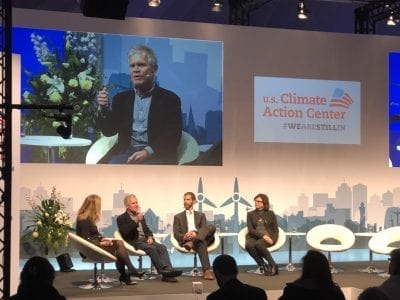
We have seen sustainability leaders from companies including Microsoft, HP, and Bank of America, talking about the importance of sustainability measures and closed-loop systems to maximizing profits.
We have seen state governors and environmental leaders, stressing the importance of sub-national regulations and new innovations in ensuring the protection of the forests that help to soak up atmospheric CO2.
And we have even seen professors and climate change leaders from some of the United States’ top research institutions, working relentlessly towards meaningful results and the dissemination of these results to policymakers throughout the nation.
While these varied parties certainly have different motives for working towards solving the worldwide problem of climate change, they did not feel defeated. The NGOs continue to solve environmental problems from a grassroots level, and the businesspeople agreed that Trump’s decisions on the Paris Agreement had no impact on their sustainability progress whatsoever.
Likewise, many influential states have committed to the We Are Still In movement, and universities across the states continue to churn out climate data and educated young people with the support of their schools. The United States is sending a clear message to the Trump administration and the rest of the world: we will not fall behind, and we will not let the decisions of one individual overpower the leadership at many sub-national levels.
International Aid & Dignity in the Face of Climate Change
Adrianna Antigiovanni, Environmental Studies
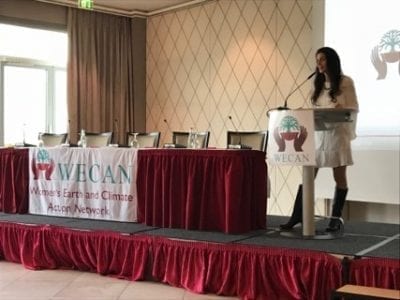
In addition to mitigation and adaptation, the two commonly heard terms when discussing how to address climate change, there is a third category called “loss and damage”. I first learned about this concept earlier this week during our daily breakfast club meetings where we discuss topics from various events that we attended the previous day. Loss and damage refers to the effects associated with climate change that cannot be prevented via mitigation or accounted for through adaptive measures. The fact that Entire Small Island Developing States will soon disappear under the rising seas is a prime example of such loss and damage that at a certain point become too much to cope with.
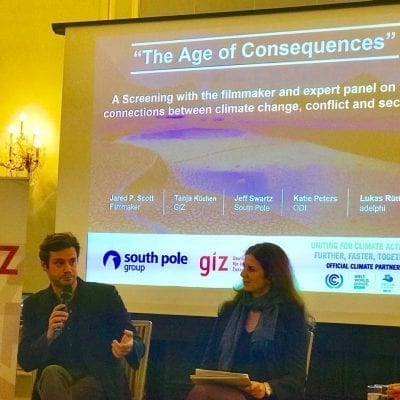
We also got the chance to attend a screening of the introduction to The Age of Consequences followed by a discussion with the filmmaker, Jared P. Scott, and several other figures who work in the national security arena. While listening to the speakers, I couldn’t help but contemplate the question that I have been presented with in the past: Where is the balance between providing international aid and empowering the receiving country to attain long term sustainability on their own? In other words, when do foreign humanitarian efforts begin to undermine a nation’s ability to thrive under their own leadership? This is an important question when contemplating how climate change exacerbates problems in context of national security because while simply giving money is politically appealing, it may not necessarily be the most effective method, and may even serve as counterproductive to the end goal.
In order to not propagate the destructive narrative that people from developing countries are helpless, one must be careful to not take the movie at face value, which may make it possible to mistake climate victims (in the form of refugees for example) as security threats. But rather quite the opposite is true because these “victims” are actually a uniquely vulnerable population that has the ability to offer real solutions to the problem that they have dealt with for years. We had the privilege of hearing testimonies of women on the frontlines from places that have been directly affected by climate chance such as the Maldives, Kenya, and Ecuador. Listening to the impressive and awe-inspiring speakers at the Women’s Earth and Climate Action Network Event is something I will never forget.
A Sneak Peak of ‘The Age of Consequences’
Katie Main, Environmental Engineering
I was excited to attend a special 30-minute screening of the new climate change documentary, the Age of Consequences, which was held in an over-flowing ~150 person lecture hall at Bonn University. The film was followed by a panel discussion featuring the award-winning filmmaker/director, Jared P. Scott, along with various representatives from German-based academic institutes and international sustainable development companies: Tanja Kuchen (GIZ), Katie Peters (ODI), and Lukas Ruttinger (Adelphi). The panel was moderated by Jeff Swartz, a representative from a German emissions reduction consulting firm (South Pole Group), who thankfully announced that the program would be presented in English.

National security is one of the few bipartisan issues in the United States, and was considered a high priority by 80% of American citizens polled during the 2016 election (Pew Research Center). On the other hand, climate change has become increasingly politicized by climate-denying conservatives on the right and climate activist progressives on the left.
The Age of Consequences attempts to bridge this ideological divide by presenting national security and global warming as interdependent. The movie aspires to persuade conservatives to appreciate the nexus between the effects of climate change and the consequences of global instability, poverty, hunger, and displacement of populations, ultimately leading to terrorism and war. Interviews with Sherri W. Goodman (Center for Naval Analyses), Stephen A. Cheney (retired U.S. Marine Corps Brigadier General), and David Titley (U.S. Navy Admiral) demonstrated how top military officials and analysts regarded the importance of climate change as a real and significant threat to national security.
Two things stood out to me at this event. My initial reaction was that this was a brand new perspective on climate change, designed to reach out to citizens in
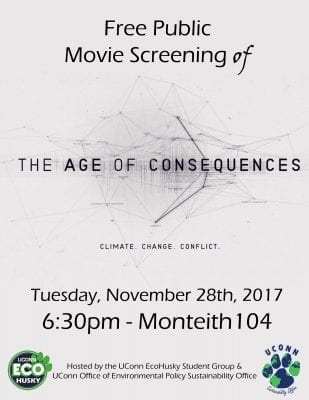
the United States who typically do not prioritize global warming, but are part of that 80% who recognize the importance of national security. Having grown up in a conservative-majority town in western Connecticut, this felt like the answer to the argument I’ve been having most of my life – climate change is a very serious threat, and one’s political orientation shouldn’t change that.
My second reaction was only realized as I listened to the way the panel members were addressing the audience. In all likelihood, the UConn group members were the only U.S. citizens in attendance, besides Jared P. Scott himself. Although all of his responses were eventually comprehensive, he sometimes hesitated, and even struggled, as he attempted to explain the varied and conflicting priorities that Americans tend to have. No doubt, the film will draw controversy back home. But, hopefully, it will also inspire a conversation. We are reaching a point of desperation where we can’t truly combat climate change without having this conversation.
Let us know what you think! The EcoHusky student group and Office of Environmental Policy will host a viewing of the full-length Age of Consequences documentary on Tuesday, November 28th from 6:30pm to 8:00pm, at Monteith Room 104. All viewpoints are welcome.